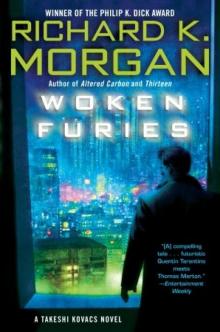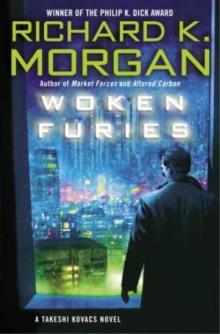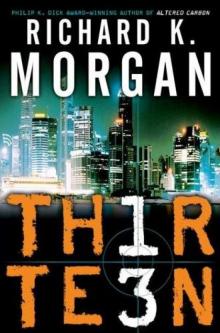- Home
- Richard K. Morgan
Black Man / Thirteen Page 8
Black Man / Thirteen Read online
Page 8
“Because he was fucking cracked,” Coyle growled. “He probably ate that stuff as well, right?”
“Difficult to say.” The lab ’face kicked in again, pointing and pulling in a bubble of data display from one of the other file houses. “Evidence gathered from the kitchen unit suggests meat scraped from the skulls may have been cooked and ingested. This does not seem to have been the case with the eyes, which were gouged out and then discarded.”
Sevgi barely glanced at the yanked-in focus. It was in any case a little too abstract for easy human digest—sketched molecular traces and a scrawled sidebar summary about microwave effect. Later she’d tramp over to the file house and review it at her own pace. Right now she was still staring up at the ruined face of Helena Larsen. Demodynamics specialist, psychiatric assessor. Divorced, signed up for Mars not long after. COLIN got a lot like this. You split from all you’ve known, why not. Your life’s columnar supports are crumbling all around you, you probably need the cash. Three years, the minimum qualified professional tour of duty, seems suddenly reasonable. On Mars you earn big, and for the short-timers at least there’s fuck-all to spend it on. You’ll come home wealthy, Helena Larsen. You’ll come home with tales of an alien skyline to tell the children you’ll someday have. You’ll have the cachet of the trip to trade off and the résumé potential it represents. You’ll have moved on. Got to be better than sitting in the ruins of your old life, right? Better than clinging to whatever fragments you—
“Investigator Ertekin?”
She blinked. She’d missed what Coyle was saying to her.
“Sorry, just thinking,” she said truthfully. “What, uh—?”
“I asked,” said the cop, with the heavy emphasis of repetition, “whether you think it’s likely that whoever did this could still be alive?”
The air in the virtuality, already a breezeless sterile cool at odds with the desert landscape, seemed to slip a couple of degrees lower. Norton looked at Sevgi, and she felt the tiny, almost imperceptible nod come up from the roots of intuition.
“Someone blew the hatches,” Rovayo pointed out.
“That could have been the automated systems.” Coyle cast a hopeful glance at the two COLIN reps. “Right?”
“It’s a possibility,” Sevgi said. “Until we see the damage to the automated systems and the n-djinn, it’s hard to know how the ship would behave on its own.”
But there was a steady thrum building in the back of her head now, like engines under decking, like the rumble of Ethan’s voice, reading to her the time she came down bad with the flu, passages out of Pynchon that came and went blurrily as she faded in and out of focus with the fever. She snapped the memory shut. Leaned into the cold sparkle of the syn, like wetting her face in a fountain. “Look, we’ll know if anyone got out alive when—”
“—the swabs come in,” Rovayo finished for her. “Right. But in the meantime, what do you think? Give us the benefit of your COLIN specialist insight. Could someone have made it down in one piece?”
“Outside of the cryocaps, it’s not likely,” Norton told her. Habitual public statement caution, the COLIN watchword. “And even if they did, that still puts them a hundred kilometers off the coast. That’s a long swim.”
“Maybe someone came to get them.” Rovayo gestured at the empty levels of the recovered surveillance adobe. “We got no satellite stream data yet, no overhead incidentals. No way to know what went on before the recovery team got there.”
Coyle shook his head. “Doesn’t make sense, Alicia. Recovery scrambled as soon as they had the coordinates.”
“Who’d they use?” Sevgi asked, trying to sound neutral. NYPD had a longstanding superiority complex when it came to the Rim’s subcontract policy on emergency services, an attitude born of, and largely borne out by, New York’s disastrous flirtation with similar schemes in the past.
Rovayo glanced at Coyle.
“Filigree Steel, right? Or, wait.” She snapped her fingers. “Did they just lose the bid to ExOp?”
“Nah, that was up in Seattle. Down here, it’s still the Filstee crew.” Coyle looked around at Sevgi and Norton. “They’re pretty good, Filigree. Did the job well over spec. Aerial cover inside twenty minutes, drop teams deployed. No way there was time for anyone to get in first. Either this guy’s dead inside with the rest of them, or he took the plunge when the hatches came off and just swam off into the sunset.”
“Wrong direction then,” said Norton drily.
Coyle peeled him a glance. “I was using a metaphor there.”
“He does that sometimes,” Rovayo said, deadpan.
“I don’t think he went into the water,” said Sevgi. “You’d have to be suicidal or clinically insane to make that mistake.”
Coyle stared at her. “Were you there earlier today, Ms. Ertekin? Did you see the in-flight cuisine? You’re trying to tell me this motherfucker might not be insane?”
Sevgi grimaced. “This motherfucker, as you put it, had spent the last several months completely alone in deep space. Alone, that is, apart from the sporadic company of fellow crewmembers revived long enough to carve edible meat from. At a minimum, he is mentally unbalanced, yes, but—”
Rovayo snorted. “No shit, he’s unbalanced. You’d have to be fucking unhinged to—”
“No.” The force in the single syllable closed the other woman down. Words marched out of Sevgi’s mouth, words she remembered Ethan saying, almost verbatim. A cold conviction was growing in her. “You wouldn’t have to be insane to do these things. You’d just have to have a goal and be determined to attain it. Let’s get this straight, early on. What we’ve seen aboard Horkan’s Pride are not the symptoms of insanity; they are only evidence of great force of will. Evidence of planning and execution shorn of any socially imposed limitation. Any mental problems this person was suffering by journey’s end are going to be a result of that execution, not a cause.”
“Speaking of planning,” said Coyle. “You going to tell me you guys don’t pack these Colony transports with emergency supplies? You know, like food? In case someone wakes up unscheduled?”
“Nobody wakes up unscheduled,” said Norton.
“Well, excuse the fuck out of me.” The big cop looked around elaborately. “I’d say on this trip someone did exactly that. Woke up unscheduled and very fucking hungry.”
“Or they stowed away,” Rovayo suggested. “Would that work?”
“That’d be next to impossible,” said Sevgi. “There’s a lot of security written into the launch protocols. You’d have to hack it all in the time between the ship’s systems being enabled and the decouple.”
Rovayo nodded. “And how long is that?”
“About forty-five minutes. It takes these older ships longer to boot up.”
“Look, about this food.” Coyle wasn’t letting go. “We all know the Colony Initiative don’t like to spend any of the cash they tax out of the rest of us on anything resembling people, but are you guys really so fucking tight you won’t spring for a box of survival rations? What happens if something goes wrong midflight?”
Norton sighed. “Yeah. Okay. All COLIN vessels have onboard contingency rations. But that’s missing the point. On each run, you’ll have two qualified spaceflight officers, cryocapped separately from the hu—the passengers.”
“The hu what?” Rovayo asked curiously.
Human freight. Sevgi finished Norton’s slip of the tongue silently for him. Yeah, we have some lovely terminology over at COLIN. Contractual Constraint. Soft Losses. Quiet Facts. Profit Drag. Public Perception Management.
She weighed in. NYPD commandments. Fuck finer feelings and circumstance, you back your partner up. Brusquely: “What we’re telling you is that there are two systems. The passenger cryocaps are wired to default into frozen. There’s no point them being awake in an emergency. They’re civilians. What are they going to do, run around screaming Oh no, we’re all going to die? Onboard air’s too expensive for that shit. They’ve got nothing to c
ontribute in a situation like that. So anything goes wrong, the whole system locks. You can’t get it open until the ship docks.”
Coyle shook his head. “Yeah, and what if the thing that goes wrong is that it thaws out?”
“How?” Sevgi gave him one of her best only-an-idiot looks. “You’re talking about deep space. You know how fucking cold it is out there? There isn’t enough ambient heat anywhere in the vessel to bring that system up a single degree from emergency frost. The only thing that might is the reactor, and that’s programmed to jettison if it fails.”
“Yeah, okay,” Rovayo doing a little partner support of her own. Sevgi caught herself in sudden sympathy. It was like passing an unexpected mirror. “So what about this other system? The spaceflight guys. They’re wired to wake up, right?”
“They can wake up.” Norton picked up again. “Under certain circumstances. If there’s a navigational emergency. The trajectory fails or you get unscheduled activity from the drive datahead maybe. Then the ship brings those two capsules up. Your spaceflight guys fix the problem, or call in the recovery if they can’t.”
That’s spaceflight guy, singular, people. The sour voice in her head would not shut up. Because—you taxpayers don’t need to know this, of course—for about a decade now we’ve been cutting back on emergency personnel by 50 percent. It’s just so fucking expensive, you see, wasting a perfectly good cryocap berth like that, after all this stuff almost never happens, right, and even if it does who needs two pilots to fix it when one can manage. That’s just overmanning, right?
“Right,” said Coyle. “And these guys got to eat and drink, right?”
“Yes, of course.” Norton gestured. Sevgi let him get on with it. Maybe from the long stay in virtual, her head was starting to hurt. “There’s tanked water anyway, for fusion mass, for radiation shielding, for the coolant systems. Even in the backup tanks, there’s more than two guys could drink even if they stayed out there for a couple of years. And obviously there’s food. But the supplies are calculated on the assumption that these two guys aren’t going to be up and about for very long. If it’s a simple problem, they fix it and then go back to sleep. If it’s not, they’ll send an SOS and then go back to sleep until the rescue ship gets there.”
“What if the system won’t let them refreeze?” Coyle wasn’t going to be shaken loose of what was apparently an endemic lack of faith in technology. Maybe, Sevgi thought sourly, he’d grown up in Jesusland and immigrated to the Rim.
Norton hesitated. “Statistically, that’s so close to impossible that—”
“Not impossible,” said Rovayo lazily. “Because, my memory serves me right, that happened to some poor motherfucker about seven, eight years back. Exactly that. Woke up and couldn’t get refrozen, had to sit out the whole voyage.”
“Yes, I remember that, too.” Norton nodded. “The cryocap spat him out and wouldn’t reset, some kind of systems glitch. Guy had to sit out the trajectory until the recovery crew got to him. See, if the transport is close enough to point of origin, emergency systems turn it around and send it back to meet the rescue ship, which cuts the retrieval time right down. If they’re closer to the end of the journey, they burn emergency fuel to speed up. However you cut it, you don’t need that much food to keep someone alive until they’re recovered.”
Well, Sevgi parenthesized to herself, not if you luck out and get a friendly orbital configuration anyway. But we don’t like to talk about that, guys. That’s what we in the trade like to call a Quiet Fact. Sort of thing even accredited COLIN staff won’t necessarily have pointed out to them. Sort of thing you might have to dig a little for.
But as Horkan’s Pride fell silently, implacably homeward, Sevgi had done that digging. Detective Ertekin has a sound analytical approach to casework, her first-year homicide report had come back one time, and shows energy and enthusiasm in absorbing fresh background detail. She has a talent for adjusting rapidly to new circumstances. She did her homework, they were trying to say, and here, nearly a decade later in the heart of COLIN, she did it again. Did her homework and found that the distance between Earth and Mars could vary by up to a factor of six. Mars, it seemed, orbited elliptically, and that plus the different orbital velocities of the two planets meant that they could be anything between about sixty and about four hundred million kilometers apart, depending on when you chose to span the gap. Even oppositions—Mars and Earth catching up to each other, running temporarily neck and neck, so to speak—could vary by a million or more klicks. COLIN transit launches took some account of these variations, but since the cycle worked itself out over several years, you couldn’t just wait around and send all your traffic at the short end. That semi-famous unscheduled wake-up guy eight or so years back had gotten lucky, hit somewhere near an opposition with the trajectory down well under the hundred million klicks.
This time around, their homecoming guy hadn’t been so lucky. Horkan’s Pride ate the thick end of the cycle, was coming home across more than three hundred million kilometers of cold, empty space.
And no lunch stops.
“Okay,” said Rovayo. “So there’s no SOS because the n-djinn is down. But there’s got to be provision for a manual backup, right?”
Norton nodded. “Yes. It isn’t difficult to do. There are step-by-step instructions nailed up in the coms nest.”
“And our guy chose to ignore them.”
“So it appears, yes. He ran silent all the way home, and presumably from somewhere close to the Mars end. There’s not enough food on board to do that, not even for one person. You want to sit in silence and wait out the whole trajectory, you’ve got to find something else to eat.”
“So the guy is fucking cracked.” The tinge of told-you-so in Rovayo’s voice. Bending back to her original assumptions. Okay, so she’d let this be a man, but she wasn’t going to believe he could be sane. “Got to be. He didn’t need—”
“Yeah, he did,” Sevgi said it to the air, detachedly. Time to run this for everybody’s benefit. “He did need to run silent. He couldn’t call in the rescue ship, and he couldn’t get back in the cryocap, assuming that it would have let him, because both those options would have defeated his whole purpose.”
A flicker of quiet. She saw Rovayo shoot an exasperated glance at Coyle. The big cop spread his hands.
“The purpose being?”
“To get home free.”
“Seems a little extreme,” said Rovayo sardonically. “Wouldn’t you say?”
“No, it’s not extreme.” Sevgi could hear herself talking, but the words seemed suddenly heavy, hard to get out. The syn was deserting her, retreating from her speech centers, leaving her with the fading light of the inspiration but no clear way to get it across. She fumbled for clarity. “Look, spaceflight’s a closed system. You dock in orbit, that’s quarantine control, post-cryocap medical checks, ID download. A week, usually, before they let you down the nanorack elevator and out. Whoever this guy was, he didn’t want to go through all that. He couldn’t afford to arrive cryocapped with the others, and he certainly couldn’t afford to be rescued. Both those options end at the nanorack. He needed to walk away unseen, unregistered. And this was the only way he could do it.”
“Yeah, but why?” Coyle wanted to know. “Six or seven months of cannibalism, isolation, probable insanity. Risking a splashdown at the end of it all. Plus hotwiring the crycocap, that’s got to carry some attendant risk, right? I mean, come on. How badly could you want to get home free?”
A wry grin from Norton, but he said nothing. Not for public consumption. Sevgi waved the diplomacy away.
“That’s missing the point. It’s no secret that there are people on Mars who wish they’d never signed up, who’d like to come home. But they’re the grunts, the cheap labor end of the Colony effort. This man was not a grunt. We’re talking about someone who’s at ease manipulating cryogen and medical datasystems, who’s able to operate the onboard emergency landing protocols—”
“Yeah, th
at’s something else I don’t get,” Rovayo said, frowning. “The whole trip, this guy’s taking the passengers in and out of the cryocaps to feed off. Why not just kill one of them and stick himself in the empty freezer in their place.”
“Kind of hard to explain when they take you out at the other end,” said Coyle drily.
His partner shrugged. “Okay, so you set the cryocap to wake you up a week out from home. Then—”
Norton shook his head. “Can’t be done. The cryocaps are individually coded at nanolevel for each passenger, and they’ve got very rigid program parameters. They’d reject a different body out of hand. You’d need to be a cryogen biotech specialist to get around that, and even then you probably couldn’t do it mid-transit. That kind of coding gets done while the ship’s in dock. They take the whole system down to do it. And you wouldn’t be able to recode an early wake-up, either, for much the same reason. The whole point of what happened here is that it was all within the existing parameters of the automated systems. There’s programmed provision for bringing a passenger temporarily out of cryogen for medical procedures. There is no provision for swapping passengers around, or letting them wake up early.”
“And he was smart enough, or skilled enough to know that,” said Sevgi. “Think about that. He knew exactly which systems he could safely subvert, and he did it without tripping a single alarm in the process.”
“Yeah, yeah, and he’s a mean hand at alternative cuisine,” growled Coyle. “Your point is?”
“My point is, anyone with the skills and strengths this man has shown would have gone out on a qualpro tour, which means a three-to five-year gig, no requirement to renew. He could have waited, come home cryocapped and comfortably wealthy.” Sevgi looked around at them. “Why didn’t he?”

 Woken Furies
Woken Furies Altered Carbon
Altered Carbon Broken Angels
Broken Angels Thirteen
Thirteen The Cold Commands
The Cold Commands The Steel Remains lffh-1
The Steel Remains lffh-1 Market Forces
Market Forces Altered Carbon tk-1
Altered Carbon tk-1 Woken Furies tk-3
Woken Furies tk-3 The Dark Defiles
The Dark Defiles Black Man / Thirteen
Black Man / Thirteen Broken Angels tk-2
Broken Angels tk-2